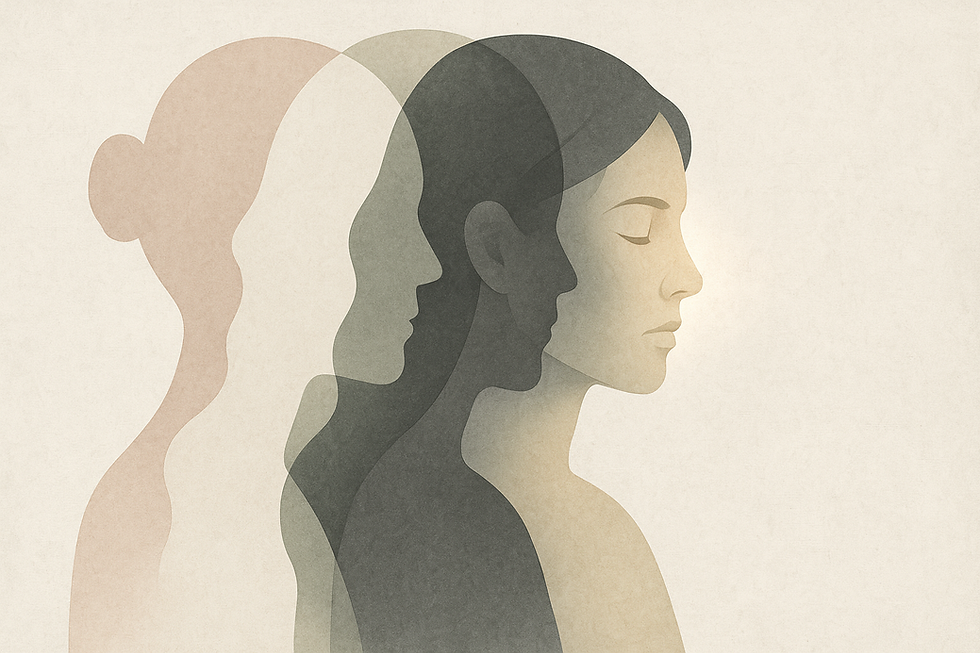Survivor Voices: Trina’s Story
- Trina Kay

- Sep 21, 2025
- 3 min read
Usually, I’m the one asking the questions. Today, I’m also answering them. I believe it’s only fair that if I’m asking others to share their stories, I begin with my own.
Q: Can you share a little about your background and what led up to the abuse?
A: Hi, I’m Trina. Thirty years ago, I was groomed—and eventually emotionally, sexually, physically, and psychologically abused—by an adult family friend. “Family friend” sounds too distant, though. This person had full access to me. At 13 I didn’t know what a red flag was. If I had seen one I would’ve probably thought it was pointing me towards fun.
Q: What did the grooming look like for you?
A: Most people don’t realize grooming takes time. It isn’t a snatch-and-grab—it’s a slow dismantling of a child’s natural safety rails. My abuser went out of their way to make me feel loved, special, and valued. I truly believed we were in a legitimate relationship. They were twice my age, but in my mind, it felt like love.
In the beginning, there were flowers, poems, songs, and summer nights under the stars. The abuse didn’t show itself until later—after I was already hooked. By then, I had been conditioned to believe that any abuse was my fault. Something as small as wearing a ponytail was treated as a betrayal: “Whore! Who are you trying to impress?” Other times it was missing laundry day or talking to the wrong person.
Q: Did anyone around you notice?
A: My abuser had a chameleon-like ability to be one person in public and another behind closed doors. They even convinced my parents to let them move in. By the time I was 15, I was living full-time with a raging, abusive alcoholic. When my parents separated, I ended up on my abuser’s couch. The sexual abuse slowed down, but the control never stopped.
What still shocks me is how many adults knew something was wrong and did nothing.
Q: How did you eventually get out?
A: There wasn’t a grand escape moment. It was more like slowly unraveling the web. The older I got, the harder I was to control. Eventually, I pulled away. But by then, the damage was done: I had failed out of high school, turned to drugs and alcohol, and carried no sense of self-worth. My abuser once told me, “I only almost killed you twice.” That sums up the environment I lived in.
Q: What was the turning point in your healing?
A: I was 22, living thousands of miles away, watching Dr. Phil on my one day off from the restaurant. He was interviewing a teen who insisted she was in love with her teacher. I found myself yelling at the TV: “He’s not your boyfriend! He’s a pedophile!”
And then it hit me. For the first time, I realized: that was me. I wasn’t in love. I wasn’t to blame. I had been a child victim of abuse.
Q: What has been the hardest part of healing?
A: Forgiving myself. For not knowing better, for not saving myself, for believing I was in control. And then, trying to forgive the adults who should’ve protected me. Forgiving my abuser has never happened, and I don’t expect it will. But the weight doesn’t crush me the way it once did. Now it’s part of my origin story—something that has shaped the work I do today.
Q: What advice would you give to parents—or your younger self?
A: Honestly, there’s nothing anyone could’ve said to me once I was in it. My advice is for the parents:
Question everything.
Insist on meeting everyone your child spends time with—especially if they’re older.
Talk early and often about healthy relationships.
Don’t be afraid to be the “bad guy.”
I always tell my own kids: I’m okay with you hating me now if it keeps you around later.
Q: How can we best honor your story?
A: Believe survivors. Even if you don’t understand, even if it doesn’t make sense to you. Their reality is complex, and it’s real. Belief is the first step in breaking the silence.
If you or someone you know is in an abusive relationship and needs immediate help, please call the
National Domestic Violence Hotline at 1-800-799-SAFE (7233), text “START” to 88788,
or contact your local authorities. You are not alone, and help is available.
If you are a survivor who feels ready to share your story as part of the Survivor Voices series, I would be honored to hear from you. Please email me at TrinaKayLLC@gmail.com with “Survivor Voices” in the subject line.
To support families navigating the aftermath of abuse and trauma, please consider making a donation to
The Blue Sunflower Foundation. Your contribution helps bring resources, awareness, and hope to survivors.





Comments